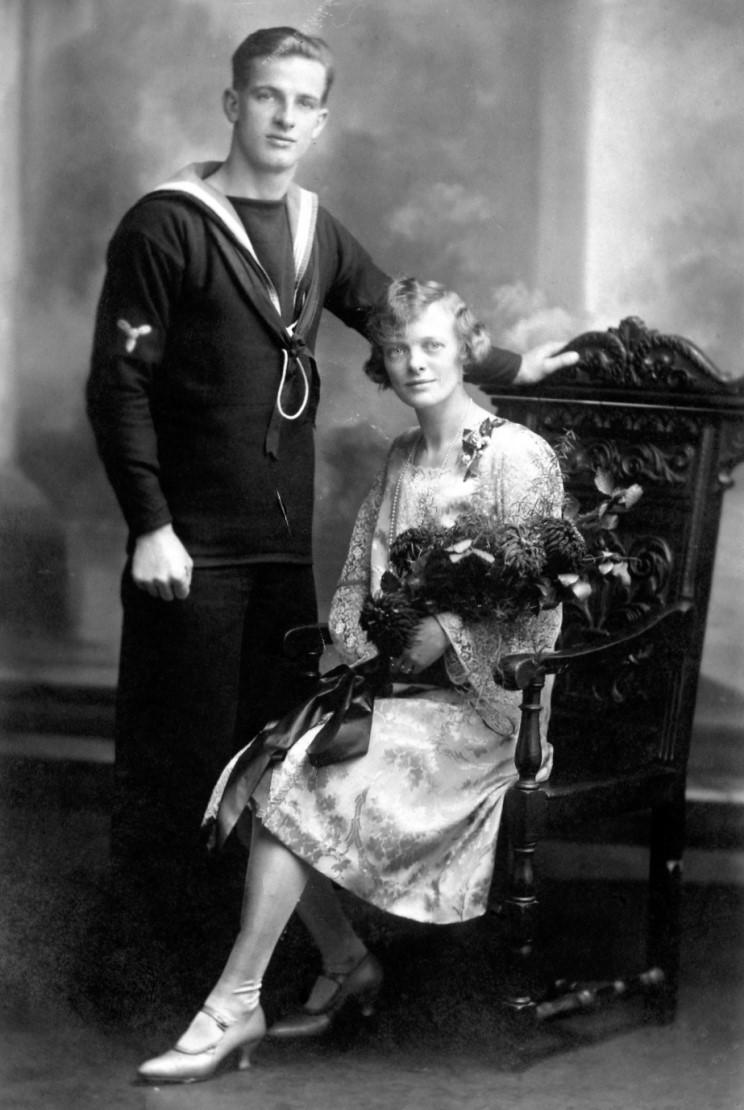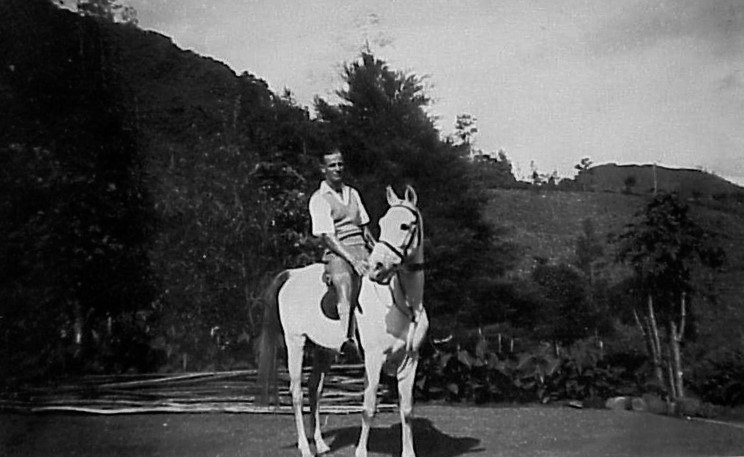Chief Petty Officer Austin "Dicky" Down, R.N. |
|
(1890s-1972) |
 |
Wedding photo of Austin and Grace Down.
|
 |
Asst. Provost Marshall Austin Down at Trincomalee, Ceylon in 1942.
|
Austin "Dicky" Down Born Paignton, Devon in the late 1890's, passed away Marandellas, Southern Rhodesia 1972. Joined RN, Devonport, very early in life. Married my Mother in the early 1920's at Hammersmith, London. At that time he served on Submarines, one of which was the R-10. Subsequently served in HMS Warspite, Rodney and others. I have little memory of him until the start of WW2 as he spent most of the time away on foreign service with one ship or another. At the start of WW1 transferred to Cammell Lairds, Birkenhead where he remained until the Prince of Wales was launched in 1940. Shortly prior to launching we visited Birkenhead for a few days traveling by train from Devon. We stayed with the family of another Naval man in Merritt Road. The second night was the heavy bomber raid (1000 bomber raid) by the Luftwaffe; they missed Cammell Laird's and the Prince of Wales, but had completely flattened the area where we were staying; fortunately, as the raids had been bad the night before, we sheltered in the Anderson shelter half sunk below ground in the middle of the road next morning to find nothing but rubble for all around us. We left that day as there was nowhere else to go and on the way back to Devon had to leave the train at some point in the midlands and hide under the bank beside the railway lines due to strafing by the enemy (ME-110's I believe). Remained on board Prince of Wales as part of the Home Fleet throughout the various campaigns, North Atlantic (Bismarck), Greenland, Iceland, Canada, and Newfoundland. Vivid description of Hood being sunk, the meeting with Churchill, Roosevelt and Stalin, Mediterranean convoys thence with Force Z to the Fare East in company with Repulse and destroyer escorts; should have had the Carrier Indomitable but this ran aground and could not join them. Just before the Prince of Wales sailed the crew were given a short time off and my father cycled on, the tandem with another shipmate, who dropped off somewhere en route from Birkenhead to Paignton and back. As far as I recall he was with us for two nights only and said he would not be seeing us for some considerable time but would not say anything else. Remained with Prince of Wales until the end in December 1941 as S.P.O then C.P.O. in the engine rooms where he was when ship was attacked. He would not talk about the next hours trying to get overboard as it was something he was reticent to talk about as he did not want my mother to know about. I did understand however that it was a horrific experience getting up to the deck from down-under and only just made it. He spent hours in the drink and suffered severe oil fuel poisoning; rescued by one of the destroyers (I believe HMS Express) and taken to Singapore; subsequently on to Ceylon where he remained for some time as Assistant Prov' Marshall at Trinco' and Colombo, this due to the effect of the oil he had ingested and which affected him for the rest of his life to one degree or other. I do recall his saying at some stage in later years that the information they were given about the Japanese was either lies or very poor intelligence. He also mentioned talking afterwards to some Repulse survivors who mentioned that they were in port in South Africa prior to shipping off the Singapore and were addressed by the then South African General Smuts who gave a far different and what turned out to be realistic story about the Japanese capabilities. As he learnt later that his Admiral, Phillips, had met Smuts prior to sailing he wondered if Smuts had told him and if so why it was apparently ignored. He was awarded, oak leaves (?) for something, eventually in 1946 retired to Paignton in Devon. I left England in 1950 and parents left in 1952 for Australia where they remained for some years then on to Southern Rhodesia in the late 1960's. My Father was a staunch and loyal Navy man but in latter years in retrospect became very critical of what he described the as the SNAFU with caused unnecessary loss of his ship and shipmates due to serious errors and poor judgment made at the time resulting in the sinking of the two ships. |
Photo and text courtesy of Tony Down
|
Page published Dec. 9, 2009 |